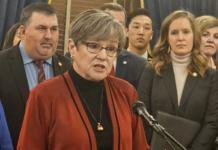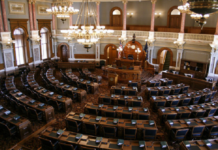(Updated to include Yellen’s testimony to the Senate Banking Committee)
Kansas Attorney General Derek Schmidt has joined with 13 other state attorneys general in a lawsuit against the Treasury Department, arguing the federal government can’t use COVID-19 relief funds as leverage to keep states from cutting taxes.
Schmidt and the attorneys general contend that a provision of the $1.9 trillion law contains “a short—but incredibly impactful—provision, which impermissibly seizes taxing authority from the states.”‘
The lawsuit comes at a time when Democratic Gov. Laura Kelly is considering whether to sign a new $284 million tax bill the Legislature passed this week that, among other things, would increase the standard deduction for Kansas taxpayers.
“The federal tax mandate disables states from decreasing taxes on their citizens for a period of over three years, while allowing them to increase taxes on their citizens and residents without restriction,” the lawsuit argues.
The lawsuit contends that the law exceeds Congress’ powers by imposing “unconstitutional and impermissible conditions” on spending the money.
It also contends the law violates states’ rights as set out in the 10th Amendment.
“The Federal tax mandate thus usurps the ability of the plaintiff states’ citizens to reduce their tax burdens and creates an impermissible chilling effect on their elected officials’ willingness to do the same — based on a threat that the federal government may claw back some or all of the states’ share of critical” funding, the lawsuit says.
“Never before has the federal government attempted such a complete take-over of state finances,” the lawsuit states.
Kansas is expected to received about $1.6 billion in coronvirus relief money that could be in jeopardy if the state enacts new tax cuts.
The lawsuit follows others filed by attorneys general in Ohio and Missouri.
Last week, Treasury Secretary Janet Yellen issued a statement saying that there was nothing in the law that prevents states from cutting taxes.
“Nothing in the act prevents states from enacting a broad variety of tax cuts,” Yellen said in a statement.
“It simply provides that funding received under the act may not be used to offset a reduction in net tax revenue resulting from certain changes in state law,” Yellen said.
However, Yellen told the Senate Banking Committee on March 24 that the agency was trying to determine what it means to use money from the law to offset tax cuts.
“We will have to define what it means to use money from this act as an offset for tax cuts,” Yellen told the committee.
“Given the fungibility of money, it’s a hard question to answer, but that’s what we’re required to do and we will do our best to offer guidance on it,” she said.
Republican U.S. Sen. Mike Crapo of Idaho urged Yellen to be cautious in how that definition is reached.
“I want to encourage you to be very restrictive in terms of the application of this prohibition and give the maximum flexibility to states and local communties as they administer these funds,” Crapo said.
Crapo, who is co-sponsoring legislation to remove the restriction on tax cuts from the law, called the restriction “troubling.”
“This is an issue that needs immediate clarity,” he said. “It seems to me the states are hamstrung right now. They can’t do anything until you give them the guidance.”
Yellen said the Treasury Department has 60 days from enactment of the law to develop guidance for how the money can be spent. President Joe Biden signed the law March 11.
The Kansas lawsuit was filed a day after the Legislature approved $284 million in tax cuts over the next three years, largely by decoupling from changes made in the federal tax code in late 2017.
Supporters of the tax bill said the changes Congress made to the federal tax code have driven up taxes for Kansans.
Kansas is a “rolling conformity” state, meaning it must conform with any changes to the federal tax code automatically unless otherwise authorized by the Legislature.
The bill passed by the Legislature contains a measure allowing Kansans to itemize on their state income tax return if they don’t itemize on their federal return.
Kansans are not as likely to itemize on their state return after federal tax reform in 2017 boosted the federal standard deduction to about $12,400 for a single person and about $24,800 for a married couple.
Fewer and fewer Kansans have been itemizing since the federal tax code changes were passed in 2017, leading to state tax increases for a married couple ranging anywhere from about $12 to about $150 depending on income and family size.
The bill also includes an exemption for income earned by foreign affiliates of U.S. companies from intangible assets such as patents, trademarks and copyrights.
The exemption for so-called global intangible low-taxed income is a controversial piece of similar legislation two years ago that the governor vetoed and Democrats have said would benefit multinational companies at the expense of working Kansans.
The federal government started taxing global intangible low-taxed income as a way of ensuring that a minimum level of foreign income tax is paid on the earnings of the foreign subsidiaries of U.S. parent companies.
Since Kansas is a so-called rolling conformity state with the federal tax code, the Legislature must act not to collect the tax.
Supporters of the provision argue that Kansas has not taxed foreign income previously and question why the state should collect the tax now.















